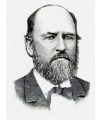This information is based on newspaper accounts and other public information and is presented as accurately as possible. Before you copy and paste this information to your website, please keep in mind that this research took a lot of effort. Appreciate it. Learn from it. But do not plagiarize it. Yes, if you think we might be talking to you, we are.
F
G
H
G. A. Henry
President
Biography
Gustavus Adolphus Henry (1804-1880) was a Whig Party leader and a law school classmate of future Confederate President Jefferson Davis. Henry, nicknamed the “Eagle Orator of Tennessee,” ran for governor of Tennessee in 1853, an election he lost to Democrat Andrew Johnson. During the Civil War, he served for three years in the Confederate Senate.

Robert West Humphreys
President
Biography
Robert W. Humphreys (1824-1878), a Montgomery County native, was a prominent lawyer in Clarksville, Tennessee.
I
John P. Ilsley
Superintendent
Biography
In early March 1860, the railroad’s board elected J.P. Ilsley as the road’s new superintendent.
“From all we learn of this gentleman, the Board has made a wise selection. As a reliable business man, we presume (he) has but few superiors. From his long connection with railroad affairs, he will doubtless prove a great acquisition to the Company.”
L
George Thomas Lewis
Receiver
Biography
George Thomas Lewis (1816-August 21, 1882), a Pennsylvania native, was instrumental in re-building the Memphis, Clarksville and Louisville Railroad after the Civil War.
He served as receiver of the railroad from July 1, 1865, to April 1, 1867.
Alonzo Skiles Livermore
General Ticket and Freight Agent
Biography
Alonzo Skiles Livermore (August 19, 1840-July 28, 1888) is a native of Rumsey, Kentucky.
In 1854, he moved with his parents to Sunbury, Pennsylvania. In September 1855, he went to Union College in Schenectady, New York, and graduated with honors in July 1858. In September 1858, he went to Columbia, Tennessee, and started working on the Tennessee and Alabama Railroad, which was later a part of the Louisville and Nashville Railroad.
In 1860, he went to Clarksville, Tennessee, as assistant superintendent of the Memphis, Clarksville and Louisville Railroad. By early April 1861, he was appointed general ticket and freight agent of the Memphis, Clarksville and Louisville Railroad. “A good office, worthily bestowed,” the Clarksville Jeffersonian newspaper observed.
When the Civil war broke out, he went to Memphis with the rolling stock of his railroad. He was here appointed general superintendent of the Mississippi and Tennessee Railroad. He retreated with the Confederates to Grenada, Mississippi, after the fall of Memphis.
At the close of the war, he went to Memphis as general superintendent of the Mississippi and Tennessee Railroad and established the company’s general offices there.
In 1871, he became superintendent of the Memphis and Little Rock Railroad and continued in this position until 1874, when he entered into a partnership with James W. Heath of the Chickasaw Iron Works, then spent some time with Randle, Heath & Livermore.
In 1881, he established the Livermore Foundry and Machine Company in Memphis and subsequently served as president of the company since that time. He has been a member of the Memphis board of education and the board of public works.
M
Robert Meek
Superintendent
Biography
Robert Meek was born on November 22, 1823, in Dutchess County, New York. He entered the railroad industry in 1848, initially working as a machinist and later held other roles, including engineer and master machinist.
From September 1886 until 1870, he served as the assistant superintendent and superintendent of the Memphis, Clarksville & Louisville Railroad. He then went to the Louisville & Nashville Railroad, serving as a division superintendent of the line between Bowling Green, Kentucky, to Paris, Tennessee, until 1873.
Between 1873 and 1881, he was the superintendent of the South & North Alabama Railroad. Later, he was the general superintendent of the Paducah & Elizabethtown and the Chesapeake & Ohio railroads. From 1884 to 1885, he worked with the Wabash, Chester & Western Railway.
In 1885, he was appointed superintendent of the Chesapeake & Nashville. He held the position until he died in Gallatin, Tennessee, on December 10, 1903.
